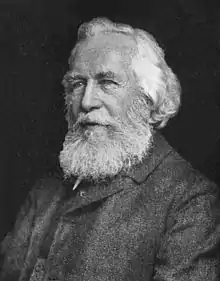Ernst Haeckel
Ernst Heinrich Philipp August Haeckel (16 February 1834 – 9 August 1919) was an influential German zoologist, naturalist, and artist.[1] He was also a philosopher and physician, but in those fields he is not regarded as particularly notable.[2] He was an atheist.[3] He left the Lutheran church in 1910. He is regarded as a pioneer of eugenics and Nazi eugenics in Germany.
Ernst Haeckel | |
|---|---|
 | |
| Born | 16 February 1834 |
| Died | 9 August 1919 (aged 85) |
| Nationality | |
| Awards | Linnean Medal (1894) Darwin–Wallace Medal (Silver, 1908) |
| Scientific career | |
| Author abbrev. (zoology) | Haeckel |
Works
Haekel was professor of comparative anatomy at the University of Jena, where he worked for 47 years, from 1862 to 1909. Haekel discovered, described and named thousands of new species, mapped a tree of life relating all life forms.[4] He coined many terms in biology, including ecology, phylum, phylogeny, stem cell, and the kingdom Protista. Haeckel promoted and popularised Charles Darwin's work in Germany and developed the controversial recapitulation theory ("ontogeny recapitulates phylogeny"). This claimed that an individual organism's biological development, or ontogeny, parallels and summarises its species' evolutionary development.[5]
The published artwork of Haeckel includes over 100 detailed, multi-colour illustrations of animals and sea creatures.[6] As a philosopher, Ernst Haeckel wrote Die Welträtsel (1895–1899, The Riddle of the Universe, 1901), and Freedom in Science and Teaching to support teaching evolution.[7]
Haeckel was a member of the nationalist and antisemitic Pan-German League (German: Altdeutscher Verband) and of the peace organization Verband für internationale Verständigung.
Books
Haekel wrote many books, some of them in multi-volumes. Among the most notable are:
- Die Radiolarien, four parts in five volumes. 1862–1888. (Rhizopoda Radiaria) Eine Monographie. Georg Reimer, Berlin.
- Generelle Morphologie der Organismen. 1866. Allgemeine Grundzüge der organischen Formen-Wissenschaft, mechanisch begründet durch die von Charles Darwin reformirte Descendenz-Theorie. Georg Reimer, Berlin.
- Das Protistenreich. 1878. Eine populäre Uebersicht über das Formengebiet der niedersten Lebewesen. Mit einem wissenschaftlichen Anhange: System der Protisten. Mit zahlreichen Holzschnitten. Ernst Günther’s Verlag, Leipzig.
- Monographie der Medusen. Six parts, some in two volumes. Gustav Fischer, Jena 1879–1881.
- The history of creation (1868) 1993, translated by E. Ray Lankester, Kegan Paul, Trench, London, 3rd edition, volume 1. His best-known work, translated into English.
- Art forms from the ocean: the Radiolarian atlas of 1862. Prestel Verlag, 2005. A reprint of his artwork for the Radiolaria. ISBN 3-7913-3327-5
Related pages
References
- Ernst Haeckel in Encyclopædia Britannica Concise, 2006, Concise. Britannica.com webpage: CBritannica-Haeckel Archived 2006-11-11 at the Wayback Machine
- Haeckel, Ernst. 1900. The riddle of the Universe at the close of the nineteenth century. Harper, reissued by Cambridge University Press, 2009. ISBN 978-1-108-00089-5
- The New York Times
- Ernst Haeckel 1868. The history of creation, translated by E. Ray Lankester, Kegan Paul, Trench, London, 1883, 3rd edition, volume 1.
- Di Gregorio, Mario A. 2005. From here to eternity: Ernst Haeckel and scientific faith. Vandenhoeck & Ruprecht. ISBN 3-525-56972-6
- Haeckel, Ernst. Art forms from the ocean: the Radiolarian atlas of 1862. Prestel Verlag, 2005. ISBN 3-7913-3327-5
- Freedom in science and teaching. German 1877, English 1879, ISBN 1-4102-1175-4.